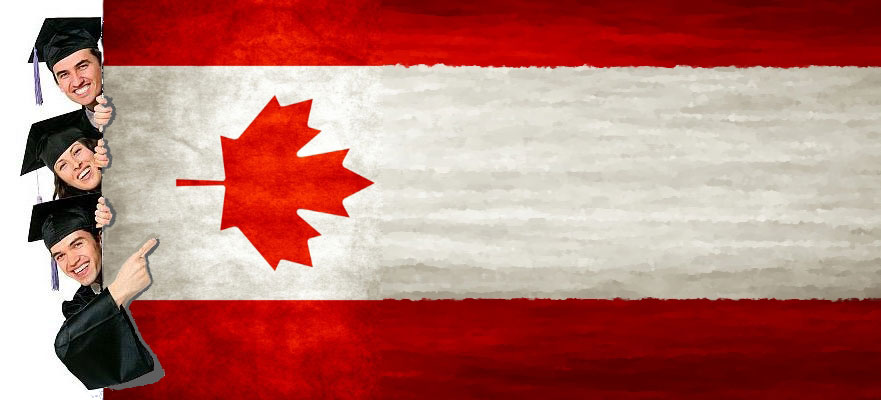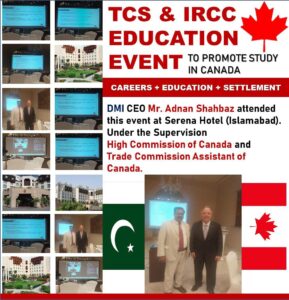Study in Canada for international Students
The land which is known for their Maple syrup production. Canada which is situated in the northern hemisphere and is part of North America. Canada is the is north of the United States. While, most people live less than 200 km from the US border. And most of the
population lives in urban centers. Much of Canada is unpopulated with only 3.7 people per square km. According to researches it shows that Canada is a great place to live and one of the finest Countries to study in Canada. Also, you can apply for Student visa Canada through easy process.
Furthermore, the Canada is classified as the additional best country in the world behind Germany, from a field of 60 countries in terms of overall sustainability, cultural influence, entrepreneurship, economic influence and, most importantly, quality of life. Canada has 10 provinces and 3 territories. We have not been. While, the population of Canada is 37.06 million people. Canada has the longest coastline of any country in the world. Altogether 202,000 km.
It borders the Pacific, Atlantic and Arctic Oceans. Canada has 20% of the world’s fresh water. Canada has more lakes than the rest of the world combined which makes it the most attractive country among others. They welcome the tourist and Students who goes there on student visa Canada. Usually in Canada people speak in English and French, as these are the two official languages spoken in Canada. While, Christianity is the largest religion in Canada, with Roman Catholics having the largest number of adherents. Christians, who represent 67.3% of the population in 2011, are followed by people who have no religion with 23.9% of the total population. Moreover, more than 4,000 students from Pakistan chose to Study in Canada.
History of Canada for international Students

The first European discovery of Canada was made by John Cabot in 1497. France claimed possession in 1534. The territories which now constitute Canada came under British power at various times by settlement conquest or cession. While, the Hudson’s Bay Company’s charter, conferring rights over all territory draining into Hudson Bay, was granted in 1670. Canada, with all its dependencies, was ceded to Great Britain by France in 1763. Furthermore, Vancouver Island was acknowledged to the British by the Oregon Boundary Treaty of 1846, and British Columbia was established as a separate colony in 1858.
As originally constituted, Canada was composed of Upper and Lower Canada (now Ontario and Quebec), Nova Scotia and New Brunswick. They united under the Act of the Imperial Parliament, the British Act, 1867. Provision was made in the Act for admission of British Columbia, Prince Edward Island Newfoundland, Rupert’s Land and the Northwest Territory into the Union. In 1870 Rupert’s Land and the Northwest territory were annexed and named the Northwest Territories, Canada having agreed to pay the Hudson’s Bay Company in cash and land for its reinfusing of claims to the territory.
By the same action the Province of Manitoba was created from a small portion of this territory and they were admitted into the Confederation in 1870. In 1871 British Columbia was admitted, and Prince Edward Island in 1873. Alberta and Saskatchewan and originally parts of the Northwest territories were admitted in 1905. Newfoundland joined Canada as its tenth province in 1949. Besides, Canada is the 14th-most-productive country by GDP, and it’s the most developed country. The capital of Canada is Ottawa, Ontario.
Culture of Canada for international Students
some of the outstanding natural beauty, Canada has a wide variety of landscapes: the mountains, the prairies, lakes and rivers with many national and provincial parks to protect the habitats. With a total land mass of 9,984,670 sq km. Canada is the second largest country in the world. The culture of Canada has been mainly predisposed by the various European cultures and traditions of its constituent nationalities, particularly British and French culture. There are also influences from the cultures of its indigenous peoples, and from the neighboring USA. Canadian uniqueness raises to the unique culture, characteristics and condition of being Canadian, as well as the many symbols and expressions that set Canada and Canadians apart from other peoples and cultures of the world.
If you are planning to apply for student visa Canada, you will get experience of life time. This country has so much to offer that you can’t get bore. The culture of Canada embodies the artistic, culinary, literary, humor, musical, political and social elements that are representative of Canada and Canadians. This is great place for students who apply for Student visa Canada. The population has also been influenced by American culture because of a shared language, proximity, television and migration between the two countries.
Food of Canada for International students

If you are Overseas international students and want Study visa Canada then Canadians typically eat three standard meals a day such as, breakfast, lunch, and dinner each of which is quite distinct. The food expenses in Canada are somewhat more expensive than in the United States. Statistics Canada reports that the average Canadian household spends about $214 per person on food each month. If you are International student want study in Canada, then it will be slightly expensive for you to dine at 5-star hotels. But the cafes are much cheaper and it will cost you less compared to expensive places in Canada. Also, you can save more money by cooking at home, which is cheaper than eating out, always, and by a wide margin. It contends that the cost of a meal at a mid-scale chain restaurant is less than that of a comparable meal cooked at home. Only by a $2 or $3. Why food is slightly expensive is the reason that the transportation costs. With a huge country and a thinly spread population, foods have to be transported long distances. This is particularly true of most fruits and vegetables that have to come from the U.S., Mexico and South America. This creates a double-whammy. First, they have to be shipped to Canada, and then transported within Canada. But you can find some amazing Canadian dishes, which taste absolutely delicious. Foods such as bannock, moose, deer, bison, pemmican, maple taffy, and Métis stews such as barley stew are all either traditional Indigenous foods or originated in Canada with roots in Indigenous cuisines, and are eaten widely throughout the country. Eating out at a restaurant, for example, can go between CA$10-15 per person. A loaf of bread and a cinema ticket are, in average, CA$2.80 and CA $12.25 respectively.
Weather of Canada for international Students
If you want study in Canada for international students then Canada is often related with cold weather and snow, but in reality, its climate is as diverse as its landscape. Generally, Canadians enjoy four very distinct seasons, particularly in the more populated regions sideways the US boundary. Subsequently, Canada is a huge country, stretching from the Pacific Ocean to the Atlantic Ocean and covering five time zones. Canada’s most southern tip lines up with northern California and the northernmost regions stretch beyond the Arctic Circle.If you are international students want study in Canada then spring in best weather to enjoy, coming alive again after the winter, and temperatures are starting to rise. Spring comes first on the west coast in February, and ramps up in the other parts of the country in late March and April, and lasts until June.
While, the weather in Canada in winters can get as low as minus 40 degrees Fahrenheit (minus 40 degrees Celsius) in the interior provinces. The coldest places in Canada are mostly in the north in the Yukon, Northwest Territories and Nunavut, where temperatures regularly dip to minus 22 degrees. We suggest to students who are applying for student visa Canada to pack clothes according to the Seasons. Comparable to springtime, layers and a slightly heavier jacket are important for those chillier days. Bring along some hats, scarves and gloves too, just in case. You’ll need a heavy winter coat, long underwear, thick wool socks and snow boots to keep you warm.
Living cost in Canada for international Students

The living cost for international student who apply for student visa Canada. As, Canada has very affordable education fees in comparison to other developed countries. That is one of the reasons why Overseas students are searching more for Canada instead of USA. And for an international student, the cost of studying in Canada and living expenses vary between $20,000 and $30,000, in Canadian dollars, per year. But, have in mind that the cost of studying in Canada can change a lot depending on the enrolled program, institution, city and the standards of living expenses. And talking specifically about tuition fees for foreigner students, the costs vary across programs and provinces. When you apply for student visa Canada and gets acceptance letter from the Canadian universities. Make sure to calculate all the expenses accordingly. International students are often very concerned about paying the tuition fees, but they can’t forget about other costs. Books, living expenses and housing should also be on the budget. Besides that, it is important to remember that before applying for a student visa Canada, foreign students must prove to the Canadian government that they have enough money to meet the financial needs. Average monthly costs of living are likely to be around CA$600-800 for food and other expenses, not including accommodation.
Universities in Canada for international students
- The University of British Columbia
- University of Toronto – St. George Campus
- McGill University
- Alberta University
- Montreal University
- Calgary University
- University Canada West
- Algoma University
- University of Manitoba
- University of Winnipeg
- Vancouver Island University
- Calgary University in Alberta
Study visa Canada for international Students

Canada is one of the best places to higher studies and the country attracts thousands of students each year from abroad. The country provides world class education which is recognized globally. Research is one of the key components of a graduate student. The universities support the students who come out with best research ideas and many scholarships are given to student for their research works. Get a Canada student visa for international students at:
- Affordable Education
- Innovative and Abundant Research Opportunities
- Immigration Possibilities
- Exciting Campus Lifestyle
- Healthy and Safe Communities
- International students can often work while they study & Internships
Best things for Study in Canada
- Numerous research opportunities
- Possibility of immigration after completing the course
- Vibrant campus atmosphere
- International students have the option of working when studying
- Good internship opportunities
Required documents for Study in Canada
-
- The minimum eligibility criterion is to be a graduate with 50% score from a UGC or AICTE recognized university.
- However, the below factors make the client case an exception and a KB query has to be raised to take confirmation on whether you can enroll the client or not before you sell.
- Year Back
- The graduation degree has to be completed within the stipulated time with no-year back.
- Example: B.Com is a 3-year degree. The client should have completed it within 3 years and not more.
- Example: Engineering is a 4-year degree. The client should have completed within 4 years and not more.
- Backlogs
- The client should not have more than 10 backlogs in his/her graduation period.
- Year Back
Post Study Graduation Work permit after Study
- A student needs to pursue a course for a minimum duration of 8 months to be eligible to stay back in Canada
- Course less than 8 months does not allow a client to stay back and apply for Post Graduation Work Permit
- For post-graduation work permit a client needs to pursue a course of duration 8 months or more.
- If the client pursues a course which is of duration less than 2 years, he/she is eligible for a post-graduation work permit of equivalent duration as the course
- Example: 8 months course = 8 months post-graduation work permit
- If the client pursues 2 years course (masters or diploma), he/she is eligible for a post-graduation work permit of 3 years
- Example: 2 years masters/diploma course = 3 years post-graduation work permit
- If the client pursues a course which is of duration less than 2 years, he/she is eligible for a post-graduation work permit of equivalent duration as the course
Cost of study in Canada
How much does it cost of studying in Canada for international students?
Tuition fees in Canada vary by institution and province, but the cost is generally more affordable when compared to other countries around the world. Technical and medical courses are more expensive than arts courses.
On an average, the tuition and fees range from CAD 7,000 to CAD 35,000 per year for an International student.
| Study Program | Average fees(in CAD*) |
| Undergraduate Program | $12,000 to $25,000 per year |
| Postgraduate master’s Program | $24,000 to $45,000 per year |
| Doctoral Degree | $9,000 to $15,000 per year |
The cost of studying in Canada will include other factors such as the cost of living and the student and visa application fees you will need to pay.
Upcoming intake for study in Canada
Canadian universities and colleges offer three intakes. Intakes may also be referred to as a semester in some institutions. The three intakes available in Canada are:
Intake 1: Fall Semester – A popular intake starts in the month of September
Intake 2: Winter Semester – Starts in the month of January
Intake 3: Summer Semester – Usually starts from April/May, this intake is available for limited programs and colleges.
We would advise you to apply well in advance because admissions and scholarships get difficult when you apply closer to the deadline. It is better to apply 6 to 9 months before the academic session starts.
Work allow for students in Canada
Student Applicant:
- Students must be over 18 years of age
- International Students can work on-campus or off-campus for up to 20 hours during university semesters and full-time during breaks such as the winter or summer holidays, without the need for a work permit
- Foreign students who are studying in a program that requires work experience such as through a co-op or internship program
Spouse:
In general, spouses are given the same rights as the spouse is already in Canada. Therefore, if the spouse in Canada has the right to work, the spouse who comes to join him or her will also have that right. But also note that only work permit holders can apply for the dependent visas.
Canada student visa requirement for international Students
You will generally need the following for your CANADA Student Visa application:
- Valid Passport
- Attested copies of 10th, 12th and Degree certificates
- Academic references – 2
- Employer references – 2
- SOP (Statement of Purpose)
- Certificates of extracurricular achievements
- An acceptance letter from your education institution
- Proof of payment
- Proof of financial funds
- Passport size photographs
- Study Permit and visa
- English Proficiency
- Your University will make you aware of additional requirements if any prior to your application
Steps to study abroad in Canada
Step1:
Research Your Options:
Before you shortlist the universities, decide what you want to study, where you want to live, overall cost, various opportunities etc.
Step 2:
Select Universities:
Shortlist the universities (about 10 universities should do) & study programs that meet your requirements and you want to apply for.
Step 3:
Prepare for entrance exams:
Prepare for the standardized tests like TOEFL/GRE/GMAT/IELTS etc. based on the requirements of the universities & collages. Register for these tests in advance. While applying for the tests you should also plan for the time required in case you need to retake the test. You should complete these tests before September of the year you wish to apply.
Step 4:
Finance your studies:
Ensure that you have the money ready for your entire period of study in Canada along with accommodation, local travel, food, and other miscellaneous expenses. Decide on how you will finance your studies – personal saving, education loans, student scholarships or assistant ship.
Step 5:
Apply to university:
Contact each university directly for the admission requirements. Every university has its own admission requirements. Complete the applications well before deadlines and send them.
Step 6:
Confirm admission:
Once you get your acceptance letters from the universities that you have applied to, choose the university you would like to study at. The next step is to pay a non-refundable deposit to the university to confirm your admission.
Step 7:
Get Student Visa:
Once you get admission confirmation done, you can apply for your student visa.
Canada Student visa dependents for international Students

A foreign national on a study visa in Canada can bring their spouse and dependent children to Canada. The spouse can also apply for an open work permit. They can work for a Canadian employer for the time the study visa of their partner is valid. However, if the spouse wants to study, they will have to apply for a separate study visa.
Study visa holders can also bring their dependent children to Canada. The children can stay for the duration of the study visa in Canada. Minor children can pursue their school education in the country provided one of their parents can either work or study in Canada. A dependent child should be below the age or 22. Children above 22 years who are not financially independent due to a physical or mental condition are also considered dependents.
After graduates study in Canada
- Canada has provided ways to encourage international students and graduates to stay, gain work experience, or otherwise contribute to Canada’s economy and culture
- In its effort to retain international students, Immigration, Refugees, and Citizenship Canada (IRCC) operates a Post-Graduate Work Permit Program. Under this program, international graduates may obtain an open work permit for up to three years
- This allows them to work for any Canadian employer in any industry without the requirement of a Canadian job offer at the time of applying
If you are interested for study in Canada then contact DMI Study Abroad .



Leave a Reply